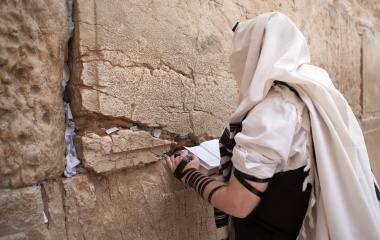
"Repentance atones for light sins...and heavy sins are suspended until Yom Kippur comes and atones. Sins between man and G-d Yom Kippur atones, sins between man and man Yom Kippur does not atone until (and unless) he appeases his friend" (Yoma 85b).
Yom Kippur is a most powerful day--in helping to reestablish our relationship with G-d--but it has little sway over relations between man and man. Those are up to us to repair, and no amount of prayer, fasting, or remorse will make any difference until we have made amends and asked for forgiveness from our fellow man. There is little that needs Talmudic elaboration; go make up, and then we can move on.
In reality, not making amends with those we have wronged may impact on much more than the inability of G-d to forgive such sins[1]. After teaching the ineffectiveness of Yom Kippur to atone for sins between man and man, the Mishnah repeats the teaching, word for word, once again: "Rabbi Elazar ben Azaria expounded, 'from all your sins before G-d, you shall be purified: sins between man and
G-d, Yom Kippur atones; sins between man and man, Yom Kippur does not atone until (and unless) he appeases his friend'". Rabbi Elazar ben Azaria adds a proof text to the teaching of the Mishnah, but surely there is no need to repeat the teaching itself?
In his commentary to the Ein Yaakov, the Rif[2] explains that Rabbi Elazar ben Azaria is teaching that as long as we have not placated those we have wronged, G-d will not forgive us--even for sins that we have sinned before G-d. That is a powerful and frightening idea.
This same notion is reflected in the subsequent Talmudic discussion (Yoma 86a) regarding chilul Hashem, the desecration of G-d's name, the one sin for which teshuva is not possible in one's lifetime. Abaye explains that someone who desecrates G-d's name distorts the mitzvah of loving G-d. "And thou shalt love the Lord thy God (Devarim 6:5); the Name of Heaven shall be beloved because of you". Abaye then gives an example: "If someone studies Torah and Mishnah and serves Torah scholars, conducts his business dealings faithfully, and speaks pleasantly with people, what do people then say concerning him? 'Happy is the father who taught him Torah, happy the teacher who taught him Torah; woe unto people who have not studied the Torah'. For this man has studied the Torah; look how fine his ways are, how righteous his deeds! Of him does Scripture say: 'And He said unto me: Thou art My servant, Israel, in whom I will be glorified'" (Isaiah 49:3).
[1] I am reminded of Simon Wiesenthal's response when asked why the Jewish people can't forgive and forget the past so many years after the Holocaust. "Only those who were murdered can forgive," he responded. We have no right to forgive wrongs committed against others. So, too, G-d can only forgive sins against Him, but is "unable" to forgive sins against man.
[2] Rabbi Yoshia ben Joseph Pinto, 17th century commentator to the Ein Yaakov, the compilation of the Talmudic aggadot by Joseph Ibn Habib (not to be confused with the Rif, Rav Issac Alfasi, the 10th century Moroccan giant who was the first to codify the Talmud). An English translation of this piece can be found in Nehama Leibowitz' Studies in Vayikra, Acharei Mot 1.



